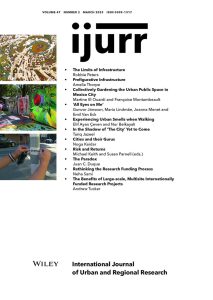In recent years, a growing number of citizen-led gardens have appeared in the urban public spaces of large cities across the world. While many of these projects are initially launched informally without any support from the state, they gradually become integrated into the social fabric of the city. To understand the evolution of the formal–informal boundaries of the practice, we argue that we should be paying attention to the specific institutional contexts that frame gardeners’ interactions with public authorities. Drawing from a study of citizen-led gardens in Mexico City, we show that informal urban gardening becomes a disconnected-from-the-state practice. On the one hand, the Mexico City government has shown a growing interest in regulating urban agriculture. On the other hand, gardeners are increasingly trying to find their own ways to formalize and perennate their practice. We suggest that this disconnection between gardeners and the state is best explained by the weakness of the institutional context in which their interactions take place. A top-down policymaking process, along with the incapacity and unwillingness of the multi-leveled city government to implement policies effectively, reinforces norms of mistrust and generates low expectations among gardeners as they interact with local authorities.
Details
Written by:
Martine El Ouardi & Françoise Montambeault
Digital Object Identifier (DOI)
https://doi.org/10.1111/1468-2427.13153
About DOI

